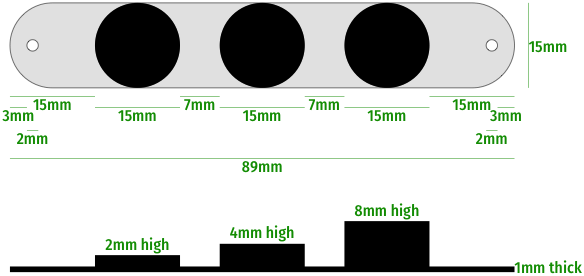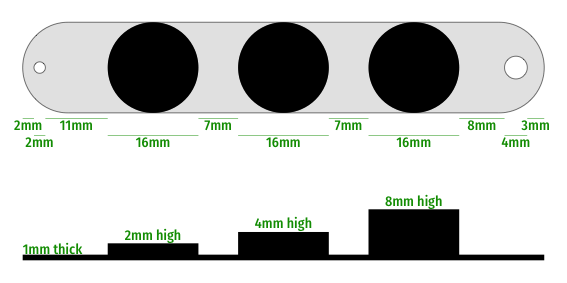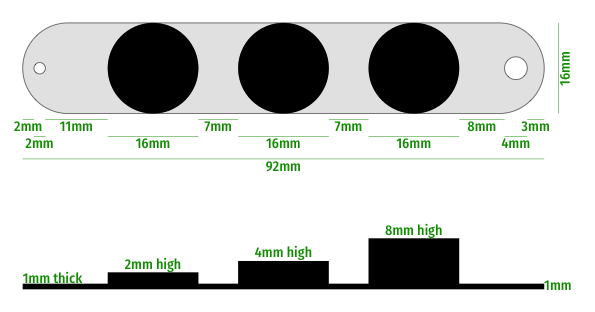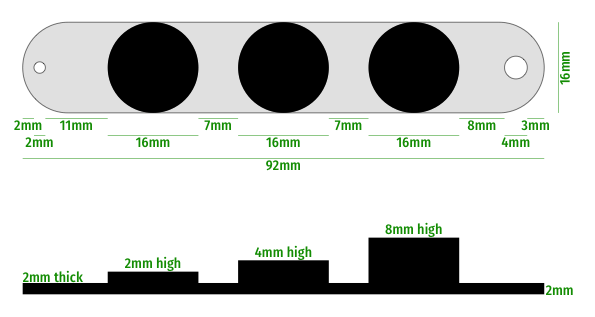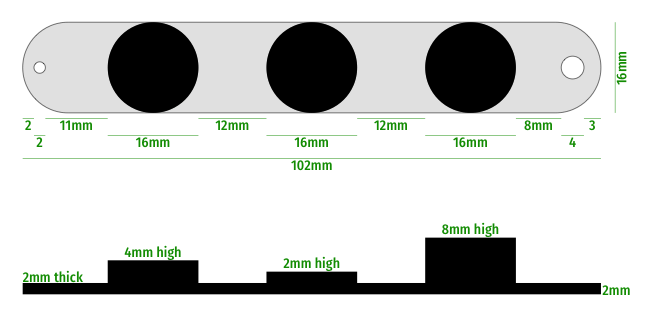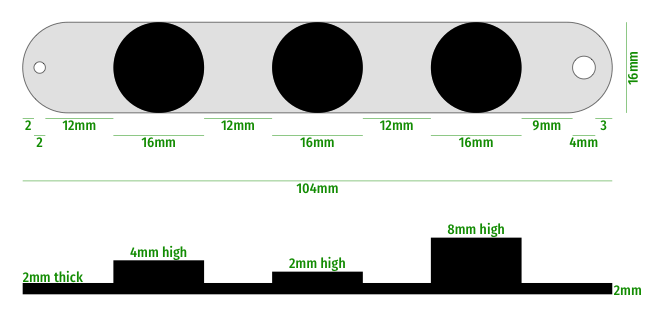Page 1 of 3
A cork pusher
Posted: 19:22 Sun 02 Jan 2022
by jdaw1
I have long wanted a cork pusher. Something to loosen a sticky cork, such that it would then release easily with a corkscrew or other device.
Latest proposal (subject to updates). Volume ≈ 5970 mm³. Aluminium density ≈ 2710 kg m⁻³ ⟹︎ weight ≈ 16.2 g.
Please comment.
Potential purchasers:
Re: A cork pusher
Posted: 19:22 Sun 02 Jan 2022
by jdaw1
As of 1915 on Sun 02 Jan 2022, the proposal is that this be made of steel. By whom, how, etc, I know not yet.
Re: A cork pusher
Posted: 19:59 Sun 02 Jan 2022
by DRT
I like the idea.
Have you measured hundreds of bottles across many decades to identify 15mm as the optimum diameter of the pusher or is it a guess?
Is 1mm thick enough to be durable when used by clumsy middle-aged men?
Are the pistons also to be made of steel or perhaps something more forgiving and less likely to chip the edges of very old bottles?
Re: A cork pusher
Posted: 20:25 Sun 02 Jan 2022
by jdaw1
DRT wrote: ↑19:59 Sun 02 Jan 2022I like the idea.
Good.
DRT wrote: ↑19:59 Sun 02 Jan 2022Have you measured hundreds of bottles across many decades to identify 15mm as the optimum diameter of the pusher or is it a guess?
Almost hundreds. Let me count. OK. Nearer, err, two. Please measure some bottles.
DRT wrote: ↑19:59 Sun 02 Jan 2022Is 1mm thick enough to be durable when used by clumsy middle-aged men?
Using the rigorous engineering of a wild speculative guess, err, I hope so. Seems about right. Would 2mm make you happier? Do you want that extra weight in your pocket?
DRT wrote: ↑19:59 Sun 02 Jan 2022Are the pistons also to be made of steel or perhaps something more forgiving and less likely to chip the edges of very old bottles?
Hard and unforgiving is the game here. User control requires no slack. If smaller than internal diameter, then that should be enough.
Different question. What piston heights are wanted?
Re: A cork pusher
Posted: 21:07 Sun 02 Jan 2022
by Alex Bridgeman

- My cork pusher
- EFD1F21B-8BAD-42C0-9EA4-F05C725F04A0.jpeg (35.57 KiB) Viewed 12993 times
I often choose to push a cork into a bottle, so I can later bag it out and have a good chance to retrieving it intact and whole. Less often I just ease the cork down a few millimetres to make it easier to extract.
I use a cork pusher to do this. My cork pusher is made of brushed stainless steel. It has slightly rounded edges on the pushing end of the cylinder and a handle / stop at the other end to prevent the cylinder dropping into the bottle. It is 155mm long and 16mm diameter.
Re: A cork pusher
Posted: 22:11 Sun 02 Jan 2022
by jdaw1
Alex Bridgeman wrote: ↑21:07 Sun 02 Jan 2022I often choose to push a cork into a bottle, so I can later bag it out and have a good chance to retrieving it intact and whole. Less often I just ease the cork down a few millimetres to make it easier to extract.
I use a cork pusher to do this. My cork pusher is made of brushed stainless steel. It has slightly rounded edges on the pushing end of the cylinder and a handle / stop at the other end to prevent the cylinder dropping into the bottle. It is 155mm long and 16mm diameter.
Is 155mm longer than needed? How do you control it such that the cork never goes too far?
Is 16mm the optimal diameter?
Re: A cork pusher
Posted: 22:50 Sun 02 Jan 2022
by jdaw1
As of 22:45 Sun 02 Jan 2022.
Re: A cork pusher
Posted: 22:56 Sun 02 Jan 2022
by winesecretary
I would say there is no circumstance in which 2mm will make a difference. I would go 4mm and 8mm and 16mm.
In terms of width - 12mm. Do not risk not being able to get it into the necks of narrow bottle. Physicists can argue about optimal newtons per square millimetre and whether that makes a difference but I doubt it.
This is the next Durand. Patent.
Re: A cork pusher
Posted: 23:00 Sun 02 Jan 2022
by jdaw1
winesecretary wrote: ↑22:56 Sun 02 Jan 2022I would say there is no circumstance in which 2mm
I would want to try 2mm before 4mm, particularly if the inner neck is not cylindrical. And 16mm would cause it to fall in. Note: we are not restricted to three pistons. I might impose an upper limit of five.
Strongly disagree. A corkscrew, because it applies its force to the centre, rips corks. On the edge, the force must be.
Re: A cork pusher
Posted: 23:04 Sun 02 Jan 2022
by JacobH
I presume the holes in the end are for a key ring? In which case would it not be possible to have a set machined with different diameters, if you are concerned to apply force to as close to the edge of the cork as is possible?
Re: A cork pusher
Posted: 23:20 Sun 02 Jan 2022
by jdaw1
JacobH wrote: ↑23:04 Sun 02 Jan 2022I presume the holes in the end are for a key ring?
Or to hang on a nail.
JacobH wrote: ↑23:04 Sun 02 Jan 2022would it not be possible to have a set machined with different diameters, if you are concerned to apply force to as close to the edge of the cork as is possible?
One could have three heights of each of multiple diameters. Is that really necessary? Surely 16mm, or even 17mm, would fit 99% of use cases.
Re: A cork pusher
Posted: 23:26 Sun 02 Jan 2022
by jdaw1
As of 23:25 Sun 02 Jan 2022.
Re: A cork pusher
Posted: 23:32 Sun 02 Jan 2022
by JacobH
Another way of doing this would be to add a drill depth collar to something like Alex's solution. That would allow you to set how much of the "piston" is exposed and therefore how deep into the bottle you are pushing the cork. 16mm ones seem readily available and I bet the tolerances would fit a 15mm piece of steel rod, too. They usually lock with a set screw which could easily be swapped out for a thumb screw.
Re: A cork pusher
Posted: 23:33 Sun 02 Jan 2022
by jdaw1
Space efficiency could be improved by having the pistons alternate sides. Thoughts?
Re: A cork pusher
Posted: 23:36 Sun 02 Jan 2022
by jdaw1
JacobH wrote: ↑23:32 Sun 02 Jan 2022Another way of doing this would be to add a drill depth collar to something like Alex's solution. That would allow you to set how much of the "piston" is exposed and therefore how deep into the bottle you are pushing the cork. 16mm ones seem readily available and I bet the tolerances would fit a 15mm piece of steel rod, too. They usually lock with a set screw which could easily be swapped out for a thumb screw.
Low and flat improves control, so it can’t be a long piston. Also, instead of a “drill depth collar”, there could be a series of holes through which a second rod goes, the rod acting as the depth limiter.
But I like the pocketability of my design.
Re: A cork pusher
Posted: 23:46 Sun 02 Jan 2022
by jdaw1
jdaw1 wrote: ↑20:25 Sun 02 Jan 2022DRT wrote: ↑19:59 Sun 02 Jan 2022Is 1mm thick enough to be durable when used by clumsy middle-aged men?
Using the rigorous engineering of a wild speculative guess, err, I hope so. Seems about right. Would 2mm make you happier? Do you want that extra weight in your pocket?
I have a bottle opener which is a flat piece of metal with appropriate holes. It feels absolutely rigid, and is 2mm thick. Upgrading.
Re: A cork pusher
Posted: 23:47 Sun 02 Jan 2022
by jdaw1
As of 23:45 Sun 02 Jan 2022.
Re: A cork pusher
Posted: 00:14 Mon 03 Jan 2022
by Alex Bridgeman
jdaw1 wrote: ↑22:11 Sun 02 Jan 2022
Alex Bridgeman wrote: ↑21:07 Sun 02 Jan 2022I often choose to push a cork into a bottle, so I can later bag it out and have a good chance to retrieving it intact and whole. Less often I just ease the cork down a few millimetres to make it easier to extract.
I use a cork pusher to do this. My cork pusher is made of brushed stainless steel. It has slightly rounded edges on the pushing end of the cylinder and a handle / stop at the other end to prevent the cylinder dropping into the bottle. It is 155mm long and 16mm diameter.
Is 155mm longer than needed? How do you control it such that the cork never goes too far?
Is 16mm the optimal diameter?
Remember I will frequently push a cork fully into a bottle. Often this requires quite a length of push since some old bottles have a double constriction around the cork. 155mm is a convenient length for my purposes.
Re: A cork pusher
Posted: 01:08 Mon 03 Jan 2022
by Glenn E.
Is 7mm between pistons truly sufficient? That does seem plenty for a normal bottle, but might required a full cleaning of the top of a bottle before use if the bottle has a thick rubber/wax capsule.
Re: A cork pusher
Posted: 09:48 Mon 03 Jan 2022
by DRT
At roughly 3 a.m. this morning I awoke with an idea about this.
Is the device to be made from a single piece of milled stainless steel? If so, perhaps a combination of AHB's "rod" and JDAW's "bar" could be devised to save some space in the pocket. I am picturing a rod of stainless steel of 100/155mm in length and 15/16mm in diameter with one half of the length milled into a 2mm thick bar with two pistons opposite one another on each side of the bar, perhaps 4mm and 8mm in height, with a rounded end with a hole for a keyring or nail. The device could be used flat as intended by JDAW or as a plunger as currently used by AHB.
Re: A cork pusher
Posted: 10:00 Mon 03 Jan 2022
by PhilW
I will very occasionally push a cork perhaps 3-4mm into the bottle to free a stuck cork, but I only ever do it using a screwpull corkscrew, so that the worm is in the cork (preventing the cork from falling into the bottle were it minded to do so); winding the handle/worm until ~3mm short of fully wound then allows you to pressure on the worm, and the cork will only move the max of 3mm, enough to release a stuck cork (I've only ever had one stuck-yet-spongy cork which would flex but not push when trying this).
I only do the above if it the cork feels stuck to the side and that the centre would otherwise pull out. I (almost) never push the cork all the way in since the top of the cork can often be grubby and I would be concerned about potentially contaminating the wine, and would use tongs if possible instead in that scenario.
Re: A cork pusher
Posted: 10:05 Mon 03 Jan 2022
by DRT
DRT wrote: ↑09:48 Mon 03 Jan 2022
At roughly 3 a.m. this morning I awoke with an idea about this.
Is the device to be made from a single piece of milled stainless steel? If so, perhaps a combination of AHB's "rod" and JDAW's "bar" could be devised to save some space in the pocket. I am picturing a rod of stainless steel of 100/155mm in length and 15/16mm in diameter with one half of the length milled into a 2mm thick bar with two pistons opposite one another on each side of the bar, perhaps 4mm and 8mm in height, with a rounded end with a hole for a keyring or nail. The device could be used flat as intended by JDAW or as a plunger as currently used by AHB.
A possible improvement:
The pistons could be separate coin-shaped components, the larger of which would have a threaded hole going part way through the centre and the smaller with a countersunk hole through the centre into which a flat-headed screw could be used to screw two pistons together on opposite sides of the bar. The device could be supplied with multiple pistons of differing heights that were interchangeable by the user.
Re: A cork pusher
Posted: 10:22 Mon 03 Jan 2022
by jdaw1
jdaw1 wrote: ↑23:33 Sun 02 Jan 2022Space efficiency could be improved by having the pistons alternate sides. Thoughts?
Silly idea. That would interfere with the pushing side. Control maximised by having that flat, and as close as possible to the business end of the operation.
Re: A cork pusher
Posted: 10:22 Mon 03 Jan 2022
by jdaw1
Alex Bridgeman wrote: ↑00:14 Mon 03 Jan 2022Remember I will frequently push a cork fully into a bottle.
PhilW wrote: ↑10:00 Mon 03 Jan 2022I will very occasionally push a cork perhaps 3-4mm into the bottle to free a stuck cork, but I only ever do it using a screwpull corkscrew, so that the worm is in the cork (preventing the cork from falling into the bottle were it minded to do so); winding the handle/worm until ~3mm short of fully wound then allows you to pressure on the worm, and the cork will only move the max of 3mm, enough to release a stuck cork (I've only ever had one stuck-yet-spongy cork which would flex but not push when trying this).
I only do the above if it the cork feels stuck to the side and that the centre would otherwise pull out. I (almost) never push the cork all the way in since the top of the cork can often be grubby and I would be concerned about potentially contaminating the wine, and would use tongs if possible instead in that scenario.
I want to loosen a sticky cork, which can then be extracted with a corkscrew. Hence the varying depths. Push in 2mm. If it pings back, if the 2mm has been absorbed by the cork’s elasticity, then I’ll push 4mm. If the cork is very elastic, 8mm.
Re: A cork pusher
Posted: 10:23 Mon 03 Jan 2022
by jdaw1
Custom engineering is £$€-tastic. A simple piece of rigid hard metal, no threads, no screws, no moving parts, might well be more economical. This leans against DRT’s more complicated arrangements.
Re: A cork pusher
Posted: 10:24 Mon 03 Jan 2022
by jdaw1
Glenn E. wrote: ↑01:08 Mon 03 Jan 2022Is 7mm between pistons truly sufficient? That does seem plenty for a normal bottle, but might required a full cleaning of the top of a bottle before use if the bottle has a thick rubber/wax capsule.
For a normal bottle, 4mm would just be enough. How thick is the wax? How much do you need?
Re: A cork pusher
Posted: 10:42 Mon 03 Jan 2022
by PhilW
I think 2mm is not enough, and would suggest minimum 3mm. Perhaps just 3,6 or 4,8mm would be sufficient?
I had similar thought to Derek regarding combined *if* full-push-in were also wanted. Noting that once the cork is moving nothing like the same pressure is required, the bar would not need to be 10mm all the way; the image in my head was similar to Dereks, with a few minor variations:
- 5/6mm circular bar, 100-120mm in length
- half the length flattened to 10mm wide, with the two push protrusions of 4mm, 8mm
(the flat section could be central or at one end; I was picturing central to allow more balanced use)
- one end split and flattened into a T, which would both stop the tool being able to fall into the bottle, as well as being more comfortable when using for full push-in.
- other end just smooth edge to prevent catching in pocket.
Very similar to some double-ended right-angle screwdrivers I have, with the mid-section flattened and one screwdriver end removed; single simple cast metal, optionally chromed.
Re: A cork pusher
Posted: 10:48 Mon 03 Jan 2022
by PhilW
jdaw1 wrote: ↑10:24 Mon 03 Jan 2022
Glenn E. wrote: ↑01:08 Mon 03 Jan 2022Is 7mm between pistons truly sufficient? That does seem plenty for a normal bottle, but might required a full cleaning of the top of a bottle before use if the bottle has a thick rubber/wax capsule.
For a normal bottle, 4mm would just be enough. How thick is the wax? How much do you need?
Agree with Glenn; I would allow 20mm from the centre of the first piston to the edge of the next, thus accomodating total capsule width of max 40mm; this is likely excessive, but better safe than sorry; I certainly wouldn't want less than 30mm. assuming 10mm pistons, then that would mean 15mm flat section between (and at outside); with 2 pistons that would be 15/10/15/10/15 = 65mm total, with three 90mm total.
Re: A cork pusher
Posted: 11:07 Mon 03 Jan 2022
by DRT
jdaw1 wrote: ↑10:23 Mon 03 Jan 2022
Custom engineering is £$€-tastic. A simple piece of rigid hard metal, no threads, no screws, no moving parts, might well be more economical. This leans against DRT’s more complicated arrangements.
I think you should test that theory with an engineer. Your current design is a complex shape from a single piece of steel that would, I think, be expensive to manufacture. Five or 6 simple components that screw together might well be cheaper.
An alternative would be to use aluminium, in which case you could have it made by a CNC machine.
Re: A cork pusher
Posted: 11:11 Mon 03 Jan 2022
by PhilW
Additional evidence-based justification for spacing >10mm between pistons: I use neck-tags on all bottles to aid in-rack identification. The previous neck tags I used had a 30mm dia hole, and I fairly often find on older bottles this is not enough to allow the tag to pass over the capsule unimpeded. I deliberately bought the latest tags with a wider hole; this is 36mm, and goes over almost all capsules; matching this would be a >=13mm spacing between 10mm pistons. Am assuming that piston depth at 8mm is potentially sufficient to otherwise foul the remaining capsule, and that you don't want to have to remove further capsule from neck (which would facilitate closer spacing).
Re: A cork pusher
Posted: 12:14 Mon 03 Jan 2022
by jdaw1
We have the flat mode (proposed bay me), and the long-cylinder model, being varies variants of Alex’s picture.
What about a simpler long-cylinder model? Cylinder, solid metal, 16mm diameter, about 100mm long. One end is widened (details TBD), for better grip, and to prevent it falling in the bottle. Near the other end are transverse holes. Each hole is 1mm diameter, and spans the whole width of the cylinder, causing there to be holes 180° apart. There is such a pair of holes starting 2mm from the end. There is another such pair 30° offset from the first, and 1mm further from the end. And several more, each 30° offset from the previous, and 1mm further from the end.
There is also a metal stick, 1mm across, which can slide into any of these transverse holes, the choice of tunnel thereby selecting the maximum depth of push.
I like it less. The two pieces will eventually become separated. It’s less simple. Less tactile. YMMV.
Re: A cork pusher
Posted: 12:15 Mon 03 Jan 2022
by jdaw1
DRT wrote: ↑11:07 Mon 03 Jan 2022An alternative would be to use aluminium, in which case you could have it made by a CNC machine.
Your words suggest knowledge that I lack. Please say more about the “CNC machine”.
jdaw1 wrote: ↑23:46 Sun 02 Jan 2022I have a bottle opener which is a flat piece of metal with appropriate holes. It feels absolutely rigid, and is 2mm thick. Upgrading.
Made of aluminium.
Re: A cork pusher
Posted: 12:17 Mon 03 Jan 2022
by jdaw1
PhilW wrote: ↑11:11 Mon 03 Jan 2022Additional evidence-based justification for spacing >10mm between pistons: I use neck-tags on all bottles to aid in-rack identification. The previous neck tags I used had a 30mm dia hole, and I fairly often find on older bottles this is not enough to allow the tag to pass over the capsule unimpeded. I deliberately bought the latest tags with a wider hole; this is 36mm, and goes over almost all capsules; matching this would be a >=13mm spacing between 10mm pistons. Am assuming that piston depth at 8mm is potentially sufficient to otherwise foul the remaining capsule, and that you don't want to have to remove further capsule from neck (which would facilitate closer spacing).
Useful actual data. Assume a 16mm piston width. With 10mm separation between pistons, a 36mm wide neck could always be accommodated. I’ll update the design to make the spacing 12mm, so there is a mite spare.
Re: A cork pusher
Posted: 12:21 Mon 03 Jan 2022
by jdaw1
As of 12:30 Mon 03 Jan 2022. Volume ≈ 5906 mm³. Aluminium density ≈ 2710 kg m⁻³ ⟹︎ weight ≈ 16.0 g.
Re: A cork pusher
Posted: 12:31 Mon 03 Jan 2022
by jdaw1
Pistons reordered. The wobbliest push will be with the shortest piston, so to assist balance, the shortest moved to the middle.
Re: A cork pusher
Posted: 12:36 Mon 03 Jan 2022
by JacobH
jdaw1 wrote: ↑12:15 Mon 03 Jan 2022
DRT wrote: ↑11:07 Mon 03 Jan 2022An alternative would be to use aluminium, in which case you could have it made by a CNC machine.
Your words suggest knowledge that I lack. Please say more about the “CNC machine”.
I think Derek is thinking of a computer-numerical controled mill which would, I think, be the only way of producing this from a single piece of metal. Essentially a computer controls a tool which removes material from a block of metal until the design is left. It is usually used for producing quite complex pieces that can’t easily be made by traditional machining:
https://www.youtube.com/watch?v=osqX7iQEnuI.
It would be quite an inefficient way of making your tool since you’d have to start with a piece of metal that is c. 10mm × 100mm × 20mm and remove quite a lot material. But that might not be a problem since it is quite small. However, I have no idea how much it would cost to prototype one.
If you were making this by hand, the obvious way would be to chop some 16mm rod into pieces of the right length and attach them to a piece of flat bar of an appropriate size. However, attaching them might be tricky. Considering that the 2mm disk is pretty small, I’m not sure you’d be able to bolt it from the back and you wouldn’t want to drill large holes in the base plate to increase the size of the “pistons” because that would significantly weaken it. I guess silver soldering it might work, although then you would have a small lip around the join rather than a sharp 90° angle. That could easily reduce the effective height by 1mm.
Probably best to identify who might make this for you and have a chat with them about ensuring a workable design.
Re: A cork pusher
Posted: 13:23 Mon 03 Jan 2022
by DRT
JacobH wrote: ↑12:36 Mon 03 Jan 2022
jdaw1 wrote: ↑12:15 Mon 03 Jan 2022
DRT wrote: ↑11:07 Mon 03 Jan 2022An alternative would be to use aluminium, in which case you could have it made by a CNC machine.
Your words suggest knowledge that I lack. Please say more about the “CNC machine”.
I think Derek is thinking of a computer-numerical controled mill which would, I think, be the only way of producing this from a single piece of metal. Essentially a computer controls a tool which removes material from a block of metal until the design is left. It is usually used for producing quite complex pieces that can’t easily be made by traditional machining:
https://www.youtube.com/watch?v=osqX7iQEnuI.
Correct.
My experience of CNC machined parts comes from my interest in astronomy. Many complex parts of telescopes (focuser housings, mounting plates, etc) are made using this technique. I don't think it is quite as wasteful as Jacob suggests as the material removed by the machine would be easily recycled.
Perhaps a good start would be to find someone who could 3-D print a prototype?
Re: A cork pusher
Posted: 13:50 Mon 03 Jan 2022
by JacobH
Sorry- I was thinking more in terms of how long it would take to remove the material since I think that is the usual way of calculating how much a piece costs to machine. But, realistically, these aren't going to be issues unless Julian is thinking of going into full-on commercial production!
Re: A cork pusher
Posted: 15:07 Mon 03 Jan 2022
by jdaw1
jdaw1 wrote: ↑12:21 Mon 03 Jan 2022Volume ≈ 5906 mm³. Aluminium density ≈ 2710 kg m⁻³ ⟹︎ weight ≈ 16.0 g.
It’s not much metal.
Re: A cork pusher
Posted: 15:16 Mon 03 Jan 2022
by nac
Having it milled or CNCed from a single piece of metal would be prohibitively expensive, even if you were producing in bulk.
An alternative might be to obtain (not sure where from) a solid tubular piece of steel(?) of the correct diameter and then cut this into slices (not sure how) of various required thicknesses and then either screw or weld these onto a piece of steel(?).
I think as a starter you need to find someone with a metal working lathe and metal cutting facilities.
Re: A cork pusher
Posted: 15:18 Mon 03 Jan 2022
by nac
nac wrote: ↑15:16 Mon 03 Jan 2022
Having it milled or CNCed from a single piece of metal would be prohibitively expensive, even if you were producing in bulk.
An alternative might be to obtain (not sure where from) a solid tubular piece of steel(?) of the correct diameter and then cut this into slices (not sure how) of various required thicknesses and then either screw or weld these onto a piece of steel(?).
I think as a starter you need to find someone with a metal working lathe and metal cutting facilities.
If you know anyone this this sort of kit (and they know how to use it) then I’m pretty sure they’ll be able to come up with a manufacturing solution.
Re: A cork pusher
Posted: 15:20 Mon 03 Jan 2022
by jdaw1
That would do the job. How is it programmed? What instructions would I need to prepare?
Re: A cork pusher
Posted: 15:25 Mon 03 Jan 2022
by jdaw1
As of 15:25 Mon 03 Jan 2022. Volume ≈ 5970 mm³. Aluminium density ≈ 2710 kg m⁻³ ⟹︎ weight ≈ 16.2 g.
Re: A cork pusher
Posted: 16:30 Mon 03 Jan 2022
by DRT
jdaw1 wrote: ↑15:20 Mon 03 Jan 2022
That would do the job. How is it programmed? What instructions would I need to prepare?
https://get-it-made.co.uk/quote/
Re: A cork pusher
Posted: 16:32 Mon 03 Jan 2022
by DRT
Do you have a cost in mind?
Re: A cork pusher
Posted: 16:56 Mon 03 Jan 2022
by akzy
Thought I'd chime in here as I often get lots of things like this made. It ain't gonna be cheap - I'd suspect around £100 per unit for a small run.
I've made the 3D model for it as it's relatively simple.
https://1drv.ms/u/s!AgU8XS8Q_6e81VQSX1I ... J?e=seCYQI
One thing I should point out is that stainless steel perhaps isnt the best option here. 3D printed carbon fiber such as carbon SLS
https://3dprintdirect.co.uk/materials/
Re: A cork pusher
Posted: 16:59 Mon 03 Jan 2022
by akzy
As another heads up, get it made is business to business only.
Re: A cork pusher
Posted: 16:59 Mon 03 Jan 2022
by PhilW
Per current diagram, width of tool is same as piston dia at 16mm - all good, and means tool would also fit inserted in bottle lengthways, so could be used per Alex for full push-in; if one end were widened slightly instead of just rounded off at same width, that would also stop tool being able to fall into bottle if used for this purpose also.
Re: A cork pusher
Posted: 17:04 Mon 03 Jan 2022
by akzy
I've used one of our suppliers to get a rough quote using "any grade aluminium".
Re: A cork pusher
Posted: 17:06 Mon 03 Jan 2022
by akzy
PhilW wrote: ↑16:59 Mon 03 Jan 2022
Per current diagram, width of tool is same as piston dia at 16mm - all good, and means tool would also fit inserted in bottle lengthways, so could be used per Alex for full push-in; if one end were widened slightly instead of just rounded off at same width, that would also stop tool being able to fall into bottle if used for this purpose also.
This would be incredibly difficult to mill. Would need at least a 3 axis CNC, probably 5 axis.
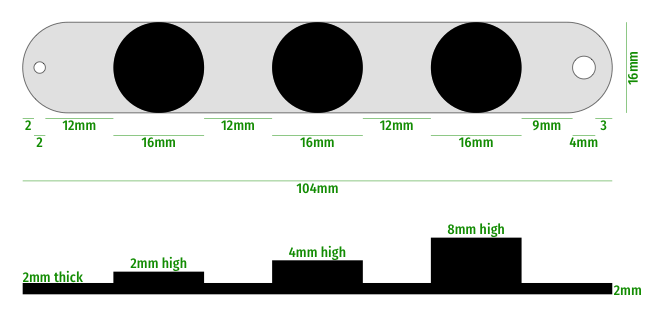 Please comment.
Please comment.
